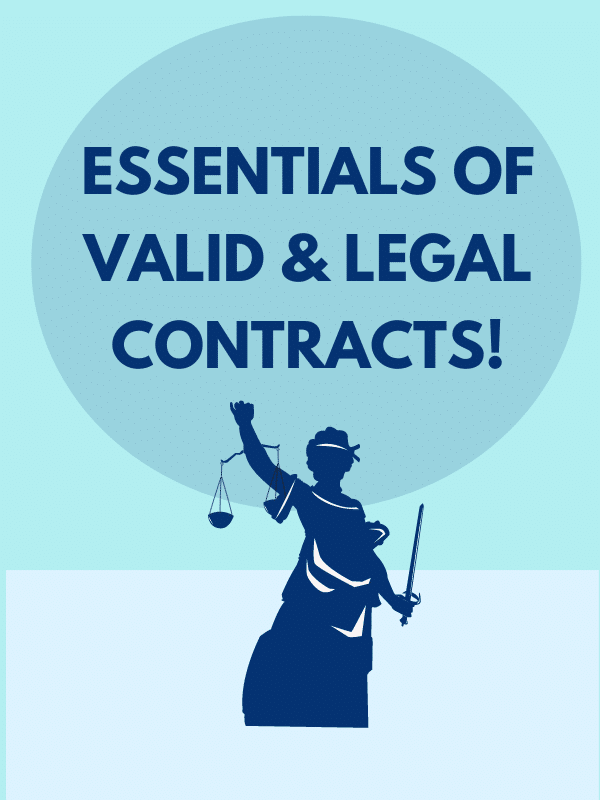Table of Contents
What makes a valid contract legal? – An Introduction!
Valid contracts are a vital aspect of business transactions and relations. In this article on contract validity, you will learn how parties to a contract must take care of many things before signing a contract to ensure its validity in law.
Before we can establish what makes a valid contract in business law, it is crucial to understand the meaning and objectives of a legally sound contract. Let’s start by defining a contract in its simplest of definitions.
What is a valid contract?
A valid contract is a legally tenable agreement between two or more parties for exchanging some goods, services, or both under certain specific conditions. The critical point is that an appropriately executed agreement becomes a legally binding document; another name for such an agreement is a contract.
In most jurisdictions, breaching a contract by any party may invite legal penalties, including fines and even imprisonment for the breachers.
What makes a contract legally binding?
The objective of the contract is to make it valid and, thus, legally enforceable. Therefore, valid contracts must fulfill certain essential conditions to make them legally binding documents for the parties involved. Read on details about all the essential element of a contract to know what makes a valid contract legally binding.
1) Offer and Acceptance in a contract:

Offer and Acceptance in a contract are the most essential and complementary elements that go hand in hand. Before moving to other must-have conditions in a valid contract, let me elaborate on both.
First and foremost, one or more parties willing to sign a contract must initiate a well-defined and lawful offer to the agreement, which must be lawfully acceptable to all the parties involved.
The key term here is “lawfully.” Any undue coercion, use of force, or illegal offer can nullify and render the contract void.
For instance, you cannot offer someone to buy contraband drugs or threaten or blackmail someone to accept even a lawful offer of buying legal products.
The offers and the proposals are interchangeable words in legal text having similar meanings. Let us understand three essential elements of a legal offer or proposal with three characteristics of offers.
First, an offer must have a genuine expression and willingness to do something or abstain from doing something.
Secondly, a proposer must propose to someone something to be called an offer; you cannot self-propose something and term it as an offer in contract law.
Finally, the expression of a proposal must reflect clear intent to get someone to do something or abstain from doing something; in other words, intent for a transaction must be there.
Before detailing on essential of a valid offer let me start by answering few crucial questions related to offers and then i shall progress to the essential elements of a valid offer.
What is the meaning of offeror?
An offeror is a term used in contract law to denote the person or legal entity that proposes an offer to another individual or legal entity seeking their acceptance.
What is the meaning of offeree?
An offeree is a term in contract law that represents an individual or a legal entity to whom an offeror made an offer. It is up to an offeree to either accept or deny any proposal made to it.
How long is an offer valid?
An offer is valid until it is accepted or lapses in a stipulated time mentioned in an offer. In the absence of explicitly quoted time, a proposal can still expire in a reasonable period.
Essential of a legally valid offer:
An offer and acceptance are the most significant elements that make a valid contract, I would elaborate on them in much greater detail, with all critical aspects covered in this article. Let us first discuss all important variables associated with legal offers.
a) Express and Implied Offers:
In contract laws, there can be both expressed and implied offers. In other words, a proposer can either communicate his proposal in written or spoken language to the desired party to the contract or the actions of a proposer conveys the offer. For instance, a seller offering to sell a laptop for 500 USD is an express offer, whereas storewide stock clearance sale brochure is an implied offer to potential buyers.
b) Terms of offer should be reasonably clear:
As far as terms of an offer are concerned, they should be reasonably clear and transparent. Vague terms of a proposal are pretty different from implied offers. In the former, no concrete expression or clear hints of an offering exist. A classic example of a vague and thus invalid offer is an agreement to agree on something in the future; Such an agreement is not a legal contract as terms for it are not yet established.
c) Distinguish offers from the invitation of offer:
An offer is not synonymous with an invitation to offer; in contract law, both have different connotations. They are as distinguished as apples and oranges.Let me elaborate on it to clarify when a legal entity invites someone to make an offer; It is known as an “invitation to offer” in legal terms, which is very different from “an offer.” The objective of invitation to offer is to circulate information based upon which people can make proposals to initiate a transaction.
For instance, a restaurant catalog marking prices of various delicacies is an invitation of offer based upon which customers can ask for the availability of dishes( that becomes an offer because they want to buy it at a quoted price). If the enquired delicacy is available and the restaurant is willing to provide it to the willing buyer, that becomes an acceptance of the offer.
d) Distinguish between Specific and General Offers:
Specific offers are the offers made to a well-defined particular individual or a legal entity. For instance, If John offers to sell Jack his car for 5000 USD, it becomes the case of a specific proposal where only jack can accept or deny John’s offer.
Whereas General offers are open-ended, any legal entity can accept them at offered terms. For instance, if John issued an advertisement and offered to sell his car for 5000 USD with the condition that the buyer must be a senior citizen, then any senior citizen can accept his general proposal.
e) Default acceptance on noncompliance doesn’t work with valid offers:
One cannot make an offer with a condition whose disobedience results in acceptance of the offer. For instance, you cannot make an offer stating that if the other party doesn’t revert in the next 30 days, it indicates acceptance of the proposal by them.
f) Two identical Cross-offer conundrum:
If two parties give each other similar offers ignoring the proposal received, it is the classic case of cross-offers. Such cross-offers are neither considered a contract nor even an acceptance in the eyes of the law. They are null and void by default.
Lapse and Revocation of offers:
There are specific circumstances under which an offer can lapse or get revoked by the proposing party. Let’s have a look at them:
a) Offer lapse with time:
A proposal can expire if another party fails to accept it in a stipulated time given by the proposer. If an offer doesn’t explicitly mention the maximum time to respond, it can still lapse in a reasonable time. The reasonability of the offer expiry time frame depends on each case’s merits. There is no thumb rule regarding this in contract law.
b) Offer lapse by Rejection:
A party not accepting an offer is one thing. The offeree can also explicitly cancel a proposal, make a cross offer, or give it a conditional acceptance, thus resulting in the mutual rejections of both bids to contract. However, a rejection is only effective if it comes to the knowledge of an offeror.
c) Offer lapse by death or insanity:
An offer can also lapse if, before acceptance, an offeror or offeree either dies or become insane. An offer automatically expires in legal terms in such an unfortunate scenario. Furthermore, no legal heirs can accept an offer on behalf of the dead or insane offeree.
d) Offer lapse by Revocation:
An offeror can easily revoke an offer made anytime till an offeree accepts it. However, for doing this, clear communication to the offeree must be made to avoid any potential legal issues.
For instance, if someone had offered their car for sale to a party, the offeror gets a better deal from another interested party before acceptance from the first offeree. The offeror can legally revoke the proposal and go ahead with a new offer to the other party.
e) Offer lapse by subsequent illegality:
An offer can also lapse bizarrely due to subsequent illegality if its terms and conditions become illegal to implement between the proposal and acceptance received.
Let me explain this in simple terms; Suppose Suzi makes an offer to sell her twelve-year-old car for 2500 USD to anyone in Florida. Assuming all of a sudden, state administration comes up with a notification banning sales of vehicles older than ten years with immediate effect. Such a ban on old vehicle sales renders Suzi’s offer illegal and lapsed overnight!
Essentials of a lawful Acceptance:

Now that you have understood all crucial aspects of the concept of the offer in contract law, it’s time to talk about the other half of this couple, i.e., acceptance.
Post proposal by an offeror, the ball comes into the court of the offeree. The attention now shifts to the offeree from the offeror because the latter approves a proposal. Let us have a look at the critical elements of legal acceptance now.
a) Only the offeree can act upon acceptance:
In all “specific offers,” the proposal is meant only for the offeree, and hence only they can accept or deny the request. It is essential to point out that this rule does not apply to “general offers”; Such offers are for anybody who fills the associated condition amongst the general public or legal entities.
b) Acceptance must be absolute without conditions:
An offeree must accept a proposal in totality without any reservations or ifs and buts to cut the ice for a legal contract. If they feel the offer is unreasonable, they must either deny it or ask the offeror to revoke it and issue a new and acceptable proposal for a legal contract.
c) Explicit and reasonable expression of acceptance:
An offeree must convey the acceptance to the offeror in a clear, unambiguous, and reasonable manner or in a way the offeror has requested them while proposing to them for a contract.
Mental acceptance does not count as legal practice in contract law, even if the offeror has stated in the offer that such an acceptance will count towards the affirmation of a contract. So all contracting parties must be mindful of this loophole in contract law. In case of dispute, it can be a ground for nullifying the legal status of the contract itself.
d) The time factor of acceptance:
Most legal offers lapse after unreasonable delays, so acceptance must also be timebound if specified within the ambit of a proposal. If the time to respond is unspecified, then an offeree must accept an offer in a reasonable time frame, depending on the nature of the contract.
2) Genuine Intent to Create Legal Relations:
There is a clear distinction in law between business contracts and informal agreements. Parties to the agreement must show genuine intent to create legally binding relations through a contract. Such ties are essential for smooth business transactions irrespective of the nature of business.
Any social or domestic agreements do not qualify as a legal relation; hence, they do not form a contract. For instance, an informal agreement between friends over dinner or a Christmas promise made to each other by a dating couple cannot constitute a legal agreement at par with a business contract.
3 ) Legal Consideration:
A business contract’s third and indispensable element is the crystal clear presence of legal consideration, without which it is a non-starter. A business agreement is a promise of exchange of some legal product or service and that the receiving party must give some lawful consideration.
Essentially agreement reflects a transaction where one or more parties provide and get something in return. In most cases, the exchanged consideration is the product’s or service’s monetary value.
Still, there can also be other legal considerations, like exchanging services or goods for some other services or goods. Recognizing that the exchange of gratuitous promises is not legally enforceable consideration is essential.
Furthermore, considerations may be for doing something or a promise to forbid something as an exchange value. Commitment to do something in the present or future is a valid consideration. Moreover, a contract can deem an act done in the past as consideration for the current agreement.
Finally, no consideration should be in breach of any law or legally untenable at the agreement stage or at the execution time.
4) The capacity of parties to contract:
The parties to a contract must be capable of understanding and executing the agreement, or else it won’t be enforceable in a court of law. All parties to a contract must clear the capacity litmus test on three accounts:
Firstly all parties to a contract must be major; that is, they must have obtained legal adult age, according to the jurisdiction. Contracts signed by minors are invalid in law.
Secondly, all parties to a contract must be of sound mental health; in other words, contracts signed by mentally challenged people are almost always void and cannot stand the scrutiny of law, if required.
Thirdly, the land’s law must not prevent any party from signing a particular contract. For instance, if the law states that only American citizens can get into a specific contract, and a non-citizen signs such an agreement, it automatically becomes null and void.
5) Presence of Free Consent:

In legal terms, for a contract, free consent refers to all parties voluntarily agreeing to the same thing in the same sense. Consent obtained through the coercion and duress are against the “Free Consent” principle. Let’s have a look at them to understand the concept clearly.
a) Coercion:
Coercion broadly refers to committing or threatening to commit any legally forbidden act to gain consent for a contract. In simple words, coercion is a form of intimidation.
It may be against a direct party to an agreement; it may also be against another person, done with intent to get the “free consent” of a party to the contract.
Detaining a person or property with ill intent to cause threat or harm for getting consent are all examples of coercion. Coercion can happen in multiple ways, lets have a look:
Threat to file a legal suit for contract can be an act of coercion:
Threats to file lawsuits on false charges for obtaining consent constitute coercion but the threat to file cases on legal grounds or an actual case filed on the legal basis is beyond the ambit of coercion.
Threat to commit suicide for contract can classify as coercion:
If someone threatens to commit suicide to get consent for an agreement, it will classify as coercion. And a threat to commit suicide is illegal in most jurisdictions and is a punishable offense.
b) Duress:
Duress refers to consent obtained by giving a threat to the life or liberty of an individual or their family and friends. Duress is a form of concern in the eyes of contract law. Hence, any consent obtained by duress makes a contract invalid.
6) Object to a contract must be legal:
A legal agreement cannot trade, exchange or affect any illegal thing or entity. A valid contract essentially deals with only lawful objects.
Such a contract is void and illicit from inception, even if a valid offer and acceptance and all other conditions of a valid contract are in place.
7) A valid contract should usually be written and registered:
In most jurisdictions, a written and registered contract is essential for calling it a legally valid agreement, barring a few exceptions. Moreover, written and registered documents are handy in case of any dispute arising from a contract.
Well-written contract papers can settle most confusion arising from an agreement, for the rest courts can interpret the contract’s text for the verdict. Either way, it is a win-win situation.
8) A valid contract must be enactable:
Parties to an agreement cannot agree and sign a valid contract for something undoable or incapable of performance. For instance, if Mr. Jaby signs a contract with Ms. Jia to sell her guaranteed jackpot lottery number, such a contract is void from inception.
9) Contracts expressly voided by law are invalid:
There are instances when specific contracts are declared void and invalid by the law of the land, and no party can sign and legally enforce such agreements. For example, in most jurisdictions, contracts violating fundamental rights, the marriage acts, and some trade laws are explicitly void.
Conclusion: What makes a valid contract legal?
After reading this well-researched and incredibly detailed guide on what makes a valid contract legal, I hope you would agree that many elements impact the validity of a contract in the eyes of the law. And it is advantageous for people to understand the nitty-gritty involved in signing a valid contract.
Disclaimer:
Despite my best efforts and breakneck research on the subject, What makes a valid contract in law? I urge readers to treat the information in this article as a general guide and consult your attorney or some legal expert in your jurisdiction with specifics of your case before embarking upon any vital agreement.
Kartikay Ungrish is the Founder-director of Worthy Education Academy & Worthy Financial Services. He is a UGC NET-qualified Assistant Professor of Management, A MBA, a licenced mutual fund distributor, and a financial advisor. He helps people build wealth through prudent investments in mutual funds and other financial products. Start by creating your free wealth management account with him as your financial advisor. Contact for more details.














